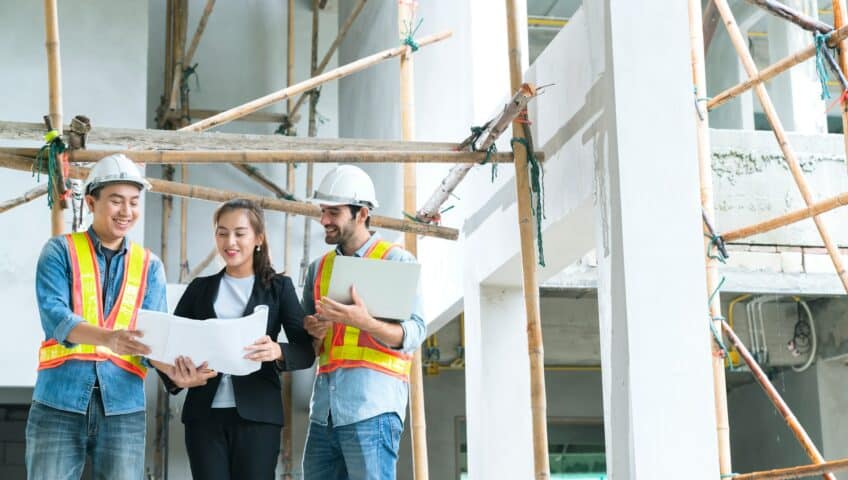The construction landscape of Maple Ridge, located in the Lower Mainland of British Columbia, has witnessed remarkable growth and advancements in recent years. As environmental concerns take center stage, it has become imperative for industry professionals to adopt environmentally friendly practices in their civil construction projects. As a full-service landscaping and construction company, New Wave Earth Works is committed to promoting eco-friendly techniques and using sustainable materials, ensuring that all projects contribute positively to the community and environment.
This comprehensive guide will delve into the various civil construction techniques and materials commonly employed in Maple Ridge. From innovative construction methods to the use of sustainable and energy-efficient materials, we will provide valuable insights that can enhance your projects’ overall efficiency, durability, and eco-friendliness. Gain an in-depth understanding of the latest trends and environmental considerations, helping you create structures that align with modern-day demands and sustainable practices.
1. Effective Site Preparation Techniques
Proper site preparation is a critical component of any successful civil construction project. By starting with a thorough and comprehensive assessment of the site, potential issues can be identified and addressed from the onset. Here are some key steps involved in effective site preparation in Maple Ridge:
– Soil testing: Analyzing the soil composition and determining its bearing capacity allows for accurate planning and engineering, ensuring a strong foundation for the project.
– Land clearing and excavation: Removing vegetation, debris, and other obstructions prepares the site for construction while minimizing potential hazards.
– Grading and leveling: Adjusting the terrain to create a stable base for construction is essential for long-term project success and environmental sustainability. This process often involves cutting and filling sections of land to create a smooth, even surface.
– Drainage solutions: Implementing efficient drainage systems helps prevent foundation issues and water accumulation, protecting the environment and the structural integrity of the project.
2. Sustainable and Durable Construction Materials
The choice of construction materials significantly impacts a project’s longevity, performance, and environmental footprint. In Maple Ridge, industry professionals emphasize the use of sustainable and durable materials for their civil construction projects. Here are some popular options:
– Concrete: An indispensable component in modern construction, concrete offers excellent compressive strength, durability, and long service life. Using recycled and supplementary cementitious materials (SCMs), such as fly ash and ground granulated blast-furnace slag, further enhances its sustainability.
– Wood: Sourced from responsibly managed forests, wood is a versatile and renewable material that can be used in different civil construction components. Engineered wood products, such as laminated veneer lumber and cross-laminated timber, also provide additional strength and versatility.
– Steel: Steel is a strong, durable, and recyclable material frequently used in construction projects for its unmatched performance. Its adaptability and ability to support heavy loads make it a popular choice for foundations, support beams, and other structural components.
– Insulated concrete forms (ICFs): ICFs are a popular, environmentally friendly alternative to traditional poured concrete and wood frame construction. ICFs provide excellent insulation, energy efficiency, and noise reduction, benefiting both the environment and the structure’s occupants.
3. Modern Techniques for Enhanced Efficiency and Sustainability
Adopting modern civil construction techniques can substantially improve efficiency, cost-effectiveness, and sustainability in Maple Ridge projects. Consider the following innovative methods:
– Precast and prefabricated construction components: Manufacturing building components off-site reduces construction time, labour costs, and material waste while improving quality control and overall project efficiency.
– Green infrastructure: Incorporating green infrastructure, such as permeable pavements, bioswales, green roofs, and rain gardens, helps manage stormwater, reduce urban heat island effect, and enhance overall environmental sustainability.
– Building Information Modelling (BIM): Utilizing BIM technology streamlines collaboration, visualization, and planning throughout the construction process. BIM enables accurate estimation of materials, reduces errors, and promotes efficient resource management, saving both time and costs while minimizing environmental impact.
4. Safety Considerations and Regulations in Maple Ridge
Safety is always a primary concern in civil construction, and it is vital to adhere to all applicable regulations and guidelines in Maple Ridge to ensure a successful project outcome. Here are some safety considerations and best practices:
– Compliance with building codes and permits: Obtaining all necessary building permits and conforming to the local building codes ensure that your project meets the required safety, energy efficiency, and environmental standards.
– Site safety planning and management: Implementing a comprehensive site safety plan and appointing a dedicated safety manager ensure a safe working environment for all onsite personnel, reducing the likelihood of accidents and injuries.
– Regular safety training and equipment inspections: Providing regular safety training to employees, as well as ensuring all tools and equipment are routinely inspected and maintained, minimize the risk of workplace accidents.
– Environmental best practices: Adhering to environmental regulations and employing sustainable construction practices help minimize the project’s environmental impact and protect sensitive ecosystems.
Embracing Eco-Friendly Civil Construction in Maple Ridge
The pursuit of eco-friendly civil construction techniques and materials in Maple Ridge not only contributes positively to the environment, but also enhances project efficiency, cost-effectiveness, and long-term performance. By incorporating sustainable practices such as effective site preparation, use of green construction materials, modern construction techniques, and adherence to safety and environmental regulations, we can build a better future for both the local community and the environment.
New Wave Earth Works stands at the forefront of eco-conscious landscaping and civil construction in the Lower Mainland of British Columbia. If you’re looking to embark on a civil construction project that upholds sustainability and eco-friendliness, our team of dedicated professionals is here to help.
Contact New Wave Earth Works today to discuss your vision, and together, let’s create enduring and environmentally responsible structures that raise the bar for future developments.


